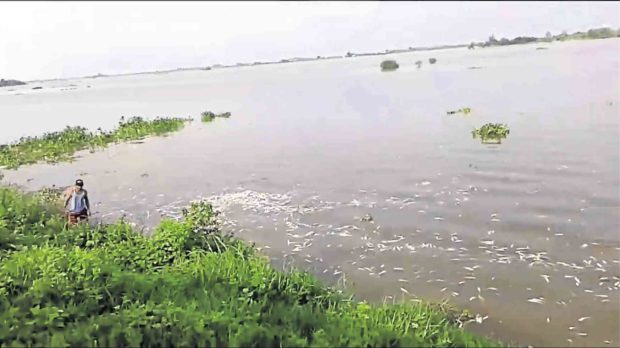
Fish kill in Pampanga RIver —CONTRIBUTED PHOTO
CITY OF SAN FERNANDO — Molasses discharged by an alcohol fermentation plant into the Pampanga River on Sept. 19 may have reduced the amount of dissolved oxygen to a degree that could have triggered a fish kill incident near the towns of Macabebe and Masantol.
At a hearing of the provincial board’s environment committee on Thursday, the Environmental Management Bureau (EMB) said the biochemical oxygen demand (BOD) after molasses spilled into the river was measured at 23,574 milligram per liter, which was far higher than the 50 mg/L allowed by law for water for swimming.
Molasses needs to be broken down by bacteria in the water and the volume of the pollutant increases the amount of oxygen which the bacteria consumes as measured by the BOD.
The higher the BOD, the more oxygen is used by bacteria, depriving other water inhabitants like fish, EMB personnel told the committee.
EMB did not directly attribute the fish kill to Far East Alcohol Corp. (Feaco), which operates the fermentation plant in Apalit town in Pampanga. Molasses is a byproduct of sugar and used in making alcoholic drinks.
Antonio Co, owner of Feaco, told the board that the discharge of 46,000 liters on Sept. 19 was an accident and was “not the cause of the fish kill [that was observed the following day].”
Molasses has no adverse effects on fish, Co said, adding that Feaco was not the only industrial establishment in the area. He also said pollution upstream was washed down.
The 260-kilometer Pampanga River drains the 30 river systems in Central Luzon toward Manila Bay. Macabebe and Masantol are downstream of the river.
EMB took the samples from a Feaco drainage canal in Barangay Sulipan in Apalit on Sept. 20.
“Although molasses is not toxic to aquatic organisms, the dumping of such substance especially in high volumes might aggravate the organic loading in the river,” the Bureau of Fisheries and Aquatic Resources said in a report to the committee.
The EMB findings prompted the board to support the decision of Apalit Mayor Peter Nucom to suspend Feaco’s permit to operate, as well as the Apalit town council’s resolution which extended the plant’s temporary closure to December.
Board Member Salvador Dimson, committee chair, also sought the closure of the Feaco drainage canal.
Board Member Nelson Calara, a resident of Apalit, said fish kills usually happen in the coastal towns during dry months, not during the rainy season.
Romano Aguinaldo, barangay captain of Sapang Kawayan in Masantol, said part of the river in the village reeked of molasses and was dark brown in color.
The fish kill has spread to fishponds. Two fishermen in Barangay Sagrada Familia in Masantol and Barangay Consuelo in Macabebe reported incurring initial losses of P193,658.
Co said his company was undertaking corrective measures, such as the installation of reinforcement belts on Feaco’s 30-year-old storage tanks and the construction of a containment perimeter wall to avoid a repeat of the spill.